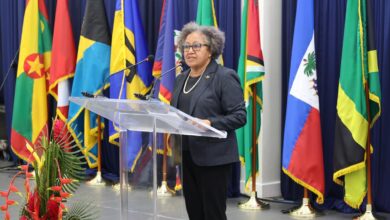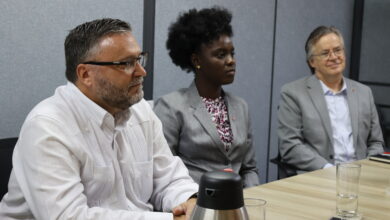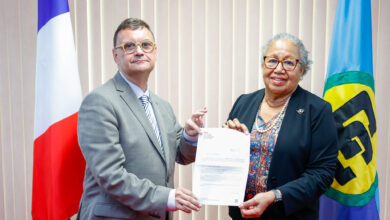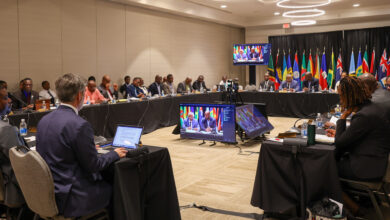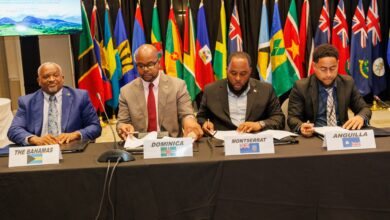The Seventh Caribbean Community (CARICOM)-Japan Consultation was held in Georgetown, Guyana, on 8-9 November 1999. The Japanese Delegation was headed by Mr. Takahiko Horimura, Director-General of the Latin American and Caribbean Affairs Bureau, Ministry of Foreign Affairs, Japan and the Delegation of CARICOM Member States was headed by H.E Ms. Elisabeth Harper, Director, Department of the Americas and Asia, Ministry of Foreign Affairs of Guyana.
The Secretary-General of CARICOM, Mr. Edwin W. Carrington delivered a speech at the opening session of the Consultation in which he stated that since the process of CARICOM-Japan Consultations was formerly initiated, a number of significant achievements had been realised. Prime among these was the greater knowledge gained of each other’s societies and cultures, which provided the best foundation for the future development of sustainable cooperation between the Two Sides.
The Meeting received a message from the Minister for Foreign Affairs of Japan, H.E. Mr. Yohei Kono in which he alluded to the significance of the timing of the Consultations being held in Guyana at the dawn of a new millennium. He acknowledged the usefulness of the policy dialogue forum between CARICOM and Japan and referred to the importance of building an even more mature partnership between Japan and CARICOM. This message was conveyed by the Leader of the Japanese Delegation.
During the course of the Consultation, the Japanese Co-chair stressed the importance of enhancing and strengthening mutual relations through intensive dialogue and exchange of people. He further reiterated Japan’s commitment to supporting CARICOM’s efforts in pursuing social and human resource development; and the mobilisation of resources in the private sector towards the promotion of trade and investment.
The CARICOM Co-chair underscored the Region’s commitment to forging a partnership for development and mutual understanding aimed at fostering closer cooperation between the Governments and peoples of Japan and the Caribbean Community. This entailed establishing mutually beneficial dialogue and exchanges with Japan to explore areas of collaboration in multilateral fora for the promotion of peace, democracy and sustainable development.
CARICOM Member States expressed sincere gratitude to the Government and people of Japan for the contribution made to the Government and people of the Commonwealth of the Bahamas in the wake of Hurricane Floyd.
The Meeting reviewed the status of cooperation between CARICOM and Japan since the commencement of the Consultations in 1993. Taking into consideration the needs of the CARICOM countries, the Two Sides recognized the concrete progress made in such areas as fisheries, tourism, disaster management, small and medium scale enterprise development, environmental improvement and telecommunications. The Two Sides renewed their determination to continue cooperation in these critical areas for the mutual benefit of their peoples.
The CARICOM Side reported on the progress to date of the economic integration process in the Region. The Japanese Side regarded this process as contributing to the sustainable development of the Region and to the strengthening of economic and trade ties both inside and outside the Region. In addition, Both Sides recognized it as necessary that regional trade agreements be consistent with the framework of the World Trade Organisation (WTO), as well as complementary to the multilateral free trade regimes.
They further emphasized the necessity to strengthen human contacts through the promotion of cultural exchange, sports, exchange of people, including students; as well as language training. The Japanese Side expressed its intention to continue its support, as far as possible, for the promotion of cultural and educational activities in the Caribbean Region. The CARICOM Side encouraged Japan’s attendance at CARIFESTA – a Caribbean Festival of Arts and Culture – scheduled to be held in St Kitts and Nevis during the month of August 2000.
The participation of Keidanren and the Japan Federation of Economic Organizations in the past Consultations was acknowledged. In this regard, the Meeting welcomed the presentation by the representative of Japan External Trade Organisation (JETRO) who outlined the scope for private sector involvement in trade and investment; and, further explained the significance of holding an exhibition of Caribbean products in Japan. Both Sides agreed to hold this exhibition on a date to be mutually decided. It was also agreed that future Consultations would encourage further dialogue between the private sectors of CARICOM and Japan.
Recognizing the importance of promoting and strengthening trade and investment between CARICOM and Japan, Both Sides reconfirmed the usefulness of the Seminars convened by Japan in areas such as Investment and Trade Promotion and the Support for Small and Medium Scale Enterprises.
Both Sides reconfirmed the necessity to continue their efforts for the reform of the United Nations (UN) in order to strengthen and democratize the Organization so that the UN would be able to adjust to the current international situation and to respond to the challenges of the new millennium. To that end, they confirmed their intention to cooperate with each other to facilitate the reforms of the UN’s financial system and of its development cooperation schemes, as well as the early realization of the reform of the Security Council, including the expansion in the number of seats both for Permanent and Non-Permanent member countries.
In the area of global economic cooperation both CARICOM and Japan confirmed their intention to cooperate with each other to achieve the balanced outcome of the next WTO round of negotiations so as to benefit all the WTO members. The CARICOM Side explained to the Delegation of Japan the Region’s perspective on the Report of the OECD on Harmful Taxation Regimes. The Japanese Side was also advised of the present status of the application for membership of the OECS countries in the IDB.
As island and low lying coastal states, both the CARICOM Member States and Japan shared their concerns about the impact of global warming; and, in this regard, the Japanese Side expressed its intention to consider what assistance Japan could provide for the development of measures which these States could adopt to counter the impact of this circumstance. The Two Sides confirmed that they would cooperate for the success of the Conference of Parties (COP) VI and for the early entry into force of the Kyoto Protocol.
CARICOM and Japan both reiterated their dependence on the oceans and attached great importance to the sustainable use of living marine resources. The Japanese Side mentioned the importance of closer cooperation with CARICOM Member States in international fora such as the International Whaling Commission (IWC).
The Meeting recognized the importance of orchestrated action by the international community to resolve narcotics issues; and confirmed their intention to strengthen their cooperative efforts in this field.
Both Sides exchanged their respective views and positions with regard to the transport of radioactive substances. The Japanese Side explained the safety of the transportation of radio active substances and the necessity for the transportation of such substances within the context of its energy policy. CARICOM reconfirmed its grave concern over these transhipments through the sub-region, as articulated by the Conference of Heads of Government in the “Statement on the Movement of Nuclear Material through the Caribbean Sea” of 5 March 1999. Understanding the concern of the CARICOM Side over the impact of the transportation on environment and tourism, the Japanese Side renewed their invitation to convene a meeting of experts in Tokyo, as early as possible, in order to address the issue and to develop mutual understanding through dialogue. The CARICOM Side indicated that a response to the invitation would be forthcoming.
The CARICOM Side elaborated its position on the Resolution on the Recognition of the Caribbean Sea as a Special Area within the context of Sustainable Development. Both Sides recognised that the regime to be developed should be consistent with all international laws and environmental Agreements currently in force, including, inter alia , the United Nations Conference on the Law of the Sea (UNCLOS). The Japanese Side indicated its intention to be constructively involved in the further discussion of this matter in the Second Committee of the United Nations General Assembly.
For the development of effective communication between the CARICOM Member States and Japan, Both Sides agreed to consider every possible approach to strengthening the communication channels between Japan and CARICOM.
They also agreed to give consideration to a possible meeting at Ministerial level of Both Sides.
Both Sides expressed satisfaction with the deliberations of the Consultation. The offer by Japan to host the Eighth Consultation in Japan in the year 2000 was accepted by CARICOM.
CARICOM Member States and Japan expressed to the Government of Guyana their sincere appreciation for the kind hospitality and consideration extended by the Government and people of Guyana in the hosting of the Consultation.

